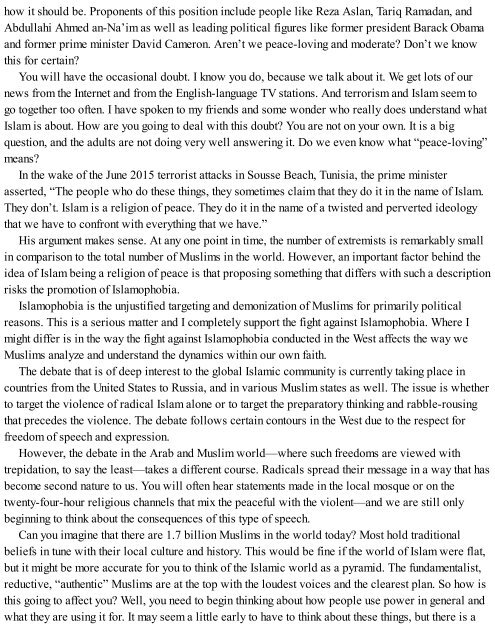1250119847
You also want an ePaper? Increase the reach of your titles
YUMPU automatically turns print PDFs into web optimized ePapers that Google loves.
how it should be. Proponents of this position include people like Reza Aslan, Tariq Ramadan, and<br />
Abdullahi Ahmed an-Na’im as well as leading political figures like former president Barack Obama<br />
and former prime minister David Cameron. Aren’t we peace-loving and moderate? Don’t we know<br />
this for certain?<br />
You will have the occasional doubt. I know you do, because we talk about it. We get lots of our<br />
news from the Internet and from the English-language TV stations. And terrorism and Islam seem to<br />
go together too often. I have spoken to my friends and some wonder who really does understand what<br />
Islam is about. How are you going to deal with this doubt? You are not on your own. It is a big<br />
question, and the adults are not doing very well answering it. Do we even know what “peace-loving”<br />
means?<br />
In the wake of the June 2015 terrorist attacks in Sousse Beach, Tunisia, the prime minister<br />
asserted, “The people who do these things, they sometimes claim that they do it in the name of Islam.<br />
They don’t. Islam is a religion of peace. They do it in the name of a twisted and perverted ideology<br />
that we have to confront with everything that we have.”<br />
His argument makes sense. At any one point in time, the number of extremists is remarkably small<br />
in comparison to the total number of Muslims in the world. However, an important factor behind the<br />
idea of Islam being a religion of peace is that proposing something that differs with such a description<br />
risks the promotion of Islamophobia.<br />
Islamophobia is the unjustified targeting and demonization of Muslims for primarily political<br />
reasons. This is a serious matter and I completely support the fight against Islamophobia. Where I<br />
might differ is in the way the fight against Islamophobia conducted in the West affects the way we<br />
Muslims analyze and understand the dynamics within our own faith.<br />
The debate that is of deep interest to the global Islamic community is currently taking place in<br />
countries from the United States to Russia, and in various Muslim states as well. The issue is whether<br />
to target the violence of radical Islam alone or to target the preparatory thinking and rabble-rousing<br />
that precedes the violence. The debate follows certain contours in the West due to the respect for<br />
freedom of speech and expression.<br />
However, the debate in the Arab and Muslim world—where such freedoms are viewed with<br />
trepidation, to say the least—takes a different course. Radicals spread their message in a way that has<br />
become second nature to us. You will often hear statements made in the local mosque or on the<br />
twenty-four-hour religious channels that mix the peaceful with the violent—and we are still only<br />
beginning to think about the consequences of this type of speech.<br />
Can you imagine that there are 1.7 billion Muslims in the world today? Most hold traditional<br />
beliefs in tune with their local culture and history. This would be fine if the world of Islam were flat,<br />
but it might be more accurate for you to think of the Islamic world as a pyramid. The fundamentalist,<br />
reductive, “authentic” Muslims are at the top with the loudest voices and the clearest plan. So how is<br />
this going to affect you? Well, you need to begin thinking about how people use power in general and<br />
what they are using it for. It may seem a little early to have to think about these things, but there is a
















